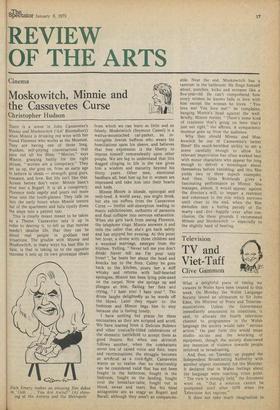REVIEW OF THE ARTS
Cinema
Moskowitch, Minnie and the Cassavetes Curse
Christopher Hudson
There is a scene in John Cassavetes's Minnie and Moskowitch ('AA' Bloomsbury) When Minnie is drinking red wine with her friend Florence who works at the Museurri, re having o They are of those long, drunken, self-pitying conversations that Pace out all his films. " Movies," says Minnie, grasping hazily for the right Phrase, "movies are a conspiracy." They set us up, she goes on, from an early age to believe in ideals — strength, good guys, romance, and love. But life isn't like that. Screen heroes don't exist. Minnie hasn't ever met a Bogart. It is all a conspiracy. n Florece nods sagely and pours out more wine into the tooth-glasses. They talk on into the early hours when Minnie teeters out of the apartment and falls tipsily down the steps into a patient taxi. This is clearly meant meant to be taken as a Theme. Cassavetes sets it up in order to destroy it, to tell us that movies needn't idealise life, that they can be about real people in goddam real situations. The trouble with Minnie and Moshowitch, in many ways his best film to date, is that in taking us to the opposite extreme it sets up its own grotesque ideals from which we can learn as little and as falsely, Moskowitch (Seymour Cassel) is a walrus-moustached car-parker, an incorrigible Jewish buffoon who wears his humiliations upon his sleeve, and believes that free eZpression is the liberty to impose himself remorselessly upon other people. We are led to understand that this dogged clinging to life in the raw gives him a wisdom and maturity beyond his thirty years. Other men, emotional hardhats all, beat him-up for it: women are impressed and take him into their hearts and beds. Minnie Moore is blonde, episcopal and well-bred. A world away, you might think, but she too suffers from the Cassavetes Curse — fretful self-absorption leading to manic exhibitionism, outbursts of paranoia and final collapse into nervous exhaustion. When she gets back from seeing Florence, the telephone rings. Minnie answers it and tells the caller that she's got back safely and has enjoyed her evening. At this point her lover, a drone with three children and a wrecked marriage, emerges from the kitchen. Yelling, "Never tell me you don't drink! Never tell me I'm your only lover! ", 'ne beats her about the head and knocks her to the floor. Calmy he goes back to the kitchen, pours her a stiff Whisky and returns with half-hearted apologies. Minnie has been lying pole-axed on the carpet. Now she springs up and plunges at him, flailing her fists and crying, '' I hate you! I hate you! ". The drone laughs delightedly as he wards off the blows. Later they repair to the bedroom and Minnie begs him to stay because she is feeling lonely. I have nothing but praise for these encounters as they are scripted and acted. We have learned from A Delicate Balance and other ironically-titled celebrations of the domestic battlefield to accept them as good theatre. But when one skirmish follows another, when the combatants never tire of raised voice and fists, tears and recriminations, the struggle becomes as artificial as a cock-fight. Cassavetes wants us to realise that no relationship can be considered valid that has not been fought in the bathroom, fought in the bedroom, fought on the landing, fought over the breakfast-table, fought out in blood, sweat and tears. But his Ideal antagonists are as stagy as Bogart and Bacall, although they aren't as companion able. Near the end, Moskowitch has a tantrum in the bathroom. He flings himself about, punches, kicks and screams like a five-year-old. He can't comprehend how every women he knows falls in love with him except the woman he loves. " You love me! You love me! " he complains, banging Minnie's head against the wall. Briefly, Minnie resists. "There's some kind of craziness that's going on here that's just not right," she affirms. A sympathetic murmur goes up from the audience.
Why then should Minnie and Moshowitch be one of Cassavetes's better films? His much-heralded ability to set a scene carefully enough to allow for relevant improvision has often worked best with minor characters who appear for long enough to deliver a monologue about themselves before vanishing; and this film yields two or three superb examples. And then, 'Gene Rowlands gives a fascinating performance as Minnie. She manages, almost, it would appear, against the director's will, to impart a restraint and coherence to the role which survives until close to the end, when the film dwindles into a boring parody of tinen marry and live happily ever after coclusion. On these grounds I recommend Minnie and Moskowitch — especially to the slightly hard of hearing.

































 Previous page
Previous page